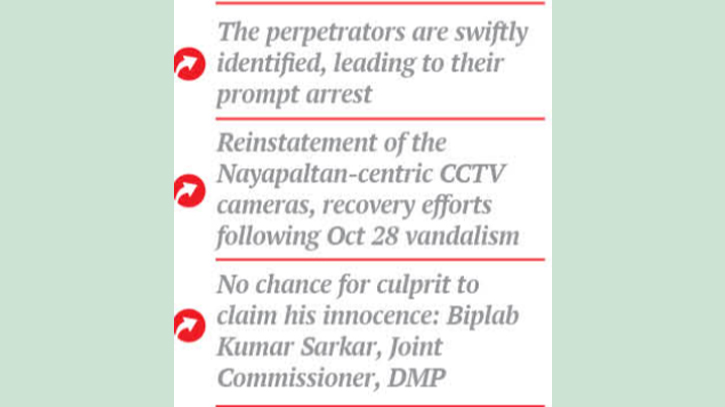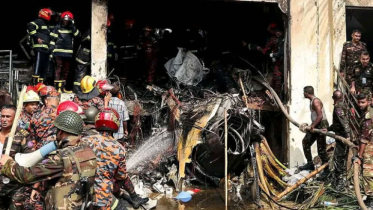
Photo : Messenger
The law enforcement authorities have implemented an extensive network of sophisticated closed-circuit television (CCTV) cameras throughout the capital. This comprehensive surveillance system comprises thousands of cameras, strategically placed in both public and discreet locations. Alongside the police-operated CCTV cameras, numerous private entities, including businesses, companies, and institutions, contribute to this pervasive surveillance network.
This initiative was prompted by the urgent need to address and rectify the rampant incidents of arson that had escalated nationwide, particularly in the aftermath of the situation surrounding the BNP convention on October 28. The police, recognising the severity of the issue, took decisive action to curb criminal activities by leveraging the capabilities of the advanced CCTV technology.
The deployed cameras boast state-of-the-art features such as motion detection, infrared night vision, and high-resolution imaging. This cutting-edge technology enables the surveillance system to operate seamlessly even in challenging conditions, such as darkness or adverse weather. As a result, individuals involved in acts of sabotage are swiftly and efficiently detected within the extensive network of CCTV cameras.
Joint Commissioner of Dhaka Metropolitan Police Biplab Kumar Sarkar reported that on October 28, the CCTV cameras strategically installed by the police to monitor the BNP's mass gathering fell victim to deliberate acts of destruction incurring a loss of Tk 39 lakh. These cameras were strategically placed in key locations, including Kakrail, Paltan, Dainik Bangla, and their surrounding areas, with the intent to ensure comprehensive surveillance and public safety during the event.
Regrettably, despite the initial purpose of monitoring the gathering, the chaotic and riotous behavior exhibited by some BNP workers in the vicinity of the rally resulted in the destruction of the police-installed CCTV cameras.
The destruction of these cameras occurred amid instances of police killings and widespread arson.
Following the BNP's rally, Biplab Kumar Sarkar highlighted the subsequent surge in arson incidents aligned with the movement's announced agenda. Notably, vehicles were being deliberately set ablaze, prompting law enforcement to respond strategically. Despite the destruction of the initial cameras deployed during the rally, the police took proactive measures by installing new cameras in various densely populated areas and targeted locations.
The senior official from the Dhaka Metropolitan Police emphasised the meticulous planning in the installation of these new cameras. They were placed with consideration for visibility in some areas while intentionally remaining inconspicuous in others. This strategic deployment aims to maximise surveillance coverage and enhance the authorities' ability to monitor and respond to incidents effectively.
In response to a question, he said, “These are high technology. This CC camera is helping us a lot. We are easily identifying those involved in arson or setting fires and bringing them under arrest. In this case, the criminal has no chance to claim his innocence.”
Khandaker Al Moin, Director of Legal and Media Wing of RAB, told The Daily Messenger, “CC cameras are helping us in many ways. Helping to identify the main culprit. RAB has arrested a total of 690 people involved in violence and sabotage in different parts of the country, including the attack and sabotage on October 28. Many of them have been caught on CCTV cameras.
Khandaker Al Moin further said that on the night of November 23, law enforcers conducted raids in the Mohammadpur and Adabar areas of the capital. These operations resulted in the apprehension of six individuals, including Ali Kaiser Pintu, a known BNP active member. The arrests were made in connection with cases related to arson, vandalism, and disorder that had occurred in the city.
Talha bin Jashim, a fire service official revealed that an unruly crowd engaged in destructive acts from October 28 to November 20, setting approximately 250 vehicles and 15 structures ablaze. According to the data, Dhaka City bore the brunt of this wave of destruction, with over a hundred vehicles deliberately set on fire, the highest number occurring in the Mirpur area.
In response to the ongoing sabotage activities surrounding the continuous hartal, blockade program since October 28, Farooq Hossain, Deputy Commissioner of the Media Center of Dhaka Metropolitan Police (DMP), told The Daily Messenger that comprehensive measures have been taken to counteract vandalism. To prevent further incidents, the entire capital has been brought under the surveillance of state-of-the-art CCTV cameras. These cameras have been strategically placed in specific locations after careful analysis of the patterns observed during the fire incidents. Additionally, to augment the surveillance network, hundreds of closed-circuit cameras (CC cameras) have been installed throughout the city.
The comprehensive efforts to enhance surveillance and security measures in the capital are evident in the strategic placement of sophisticated CCTV cameras. Mintu Road, Moghbazar, Kakrail Road, Matsya Bhavan, Press Club via High Court, Gulistan, Dainik Bangla to Motijheel, Tikatuli to Jatrabari, Signboard Road via Shanir Akhra, Jatrabari to Postgola, Babubazar, Nayabazar in Old Dhaka, Shahbagh through Farmgate, the entirety of Mirpur, Mohakhali, Banani via Uttara, Kuril Bishwa Road via Basundhara to Badda, Rampura, Malibagh, Mouchak to Rajarbagh, and extending beyond Kakrail to Nayapaltan — the entire city has been meticulously covered by these surveillance cameras.
The implementation of these high-tech CCTV cameras is a proactive measure to address security concerns and combat criminal activities, particularly incidents of arson. The coverage extends to major roadways, business districts, and densely populated areas, ensuring a comprehensive monitoring system. The technology facilitates easy identification of individuals involved in setting vehicles on fire, providing law enforcement with valuable evidence to bring perpetrators to justice, he added.
In the aftermath of the clashes with the police during the BNP's mass rally on October 28, the BNP has been consistently implementing a strategy of continuous hartal blockades. Notably, a two-day blockade is slated to commence today. The schedule for this blockade has been communicated to the public, particularly concerning its impact on vehicular movement.
It's crucial to recognise that this continuous hartal blockade poses challenges to public order and safety, prompting the police to take various measures to prevent instances of arson violence and other acts of terrorism.
Messenger/Disha








